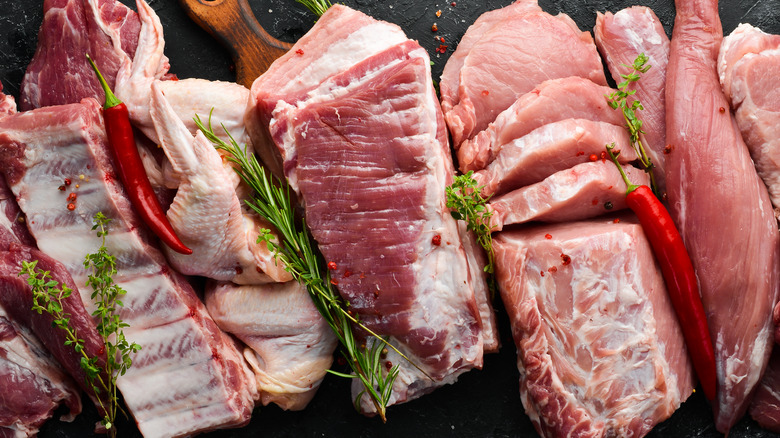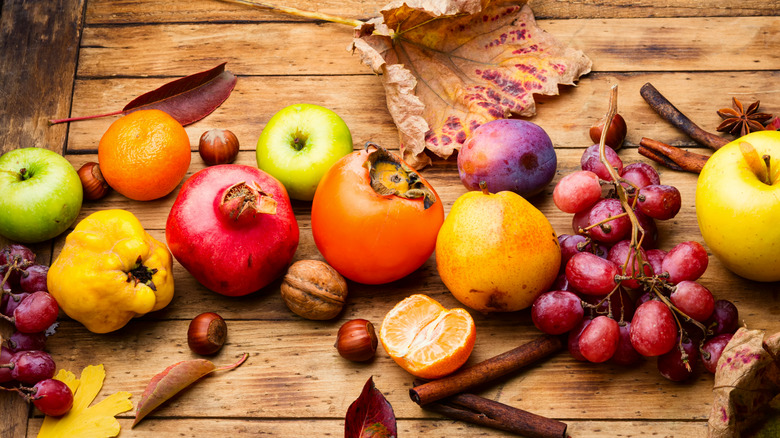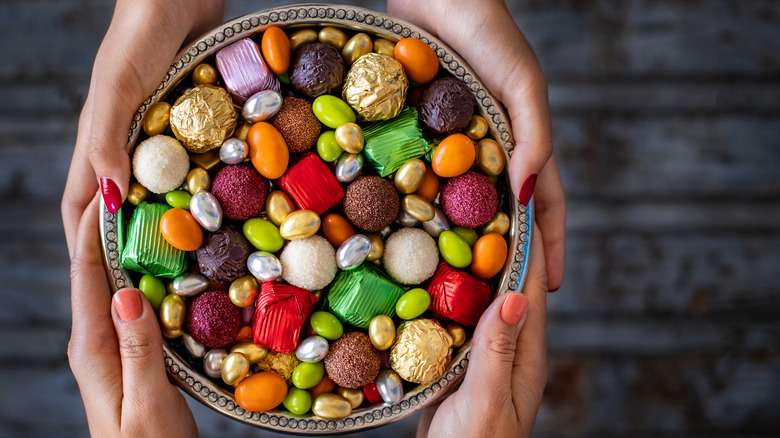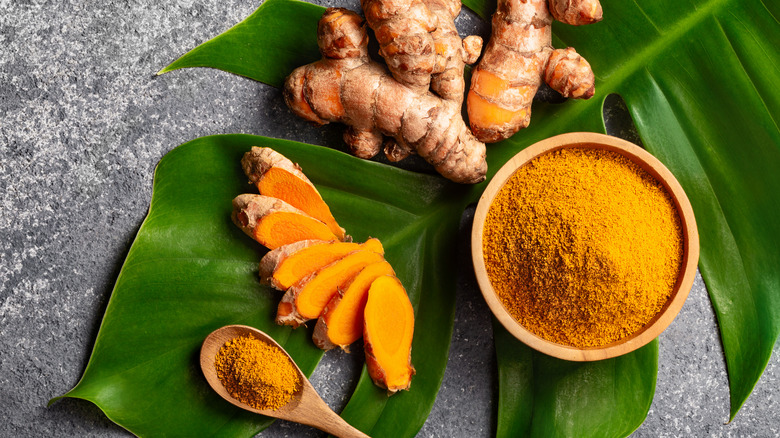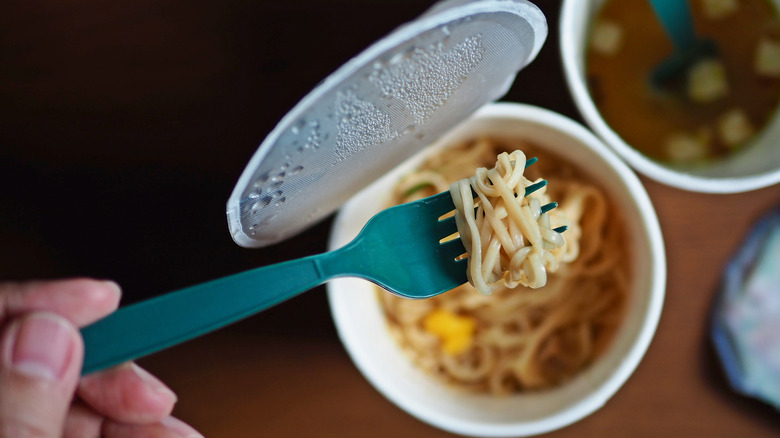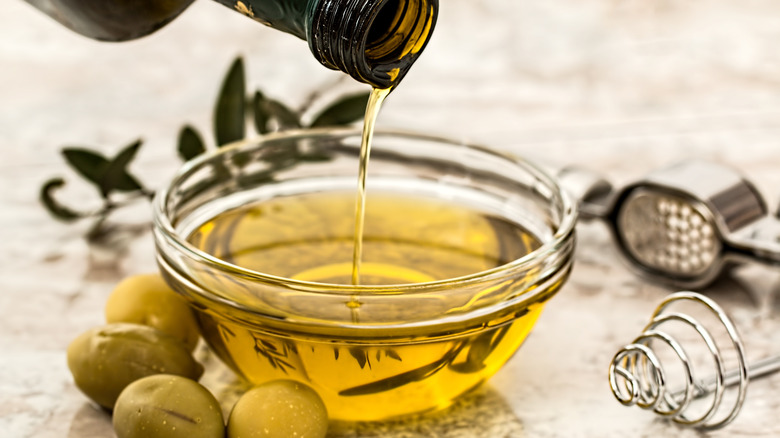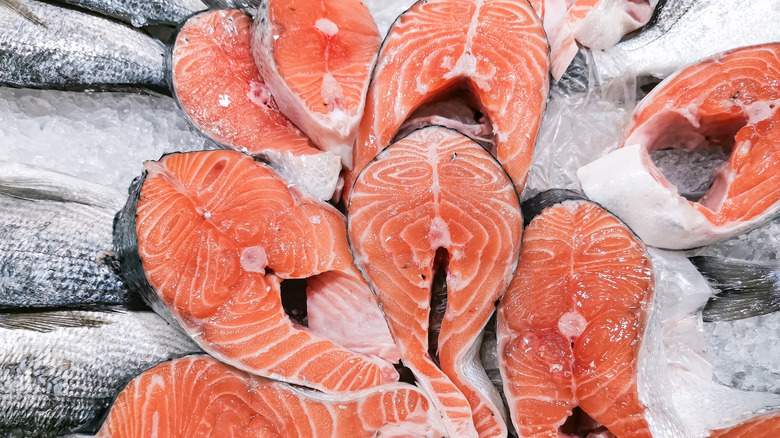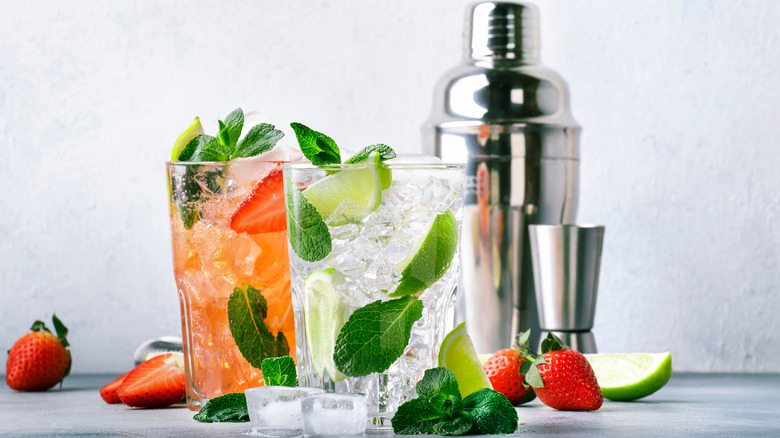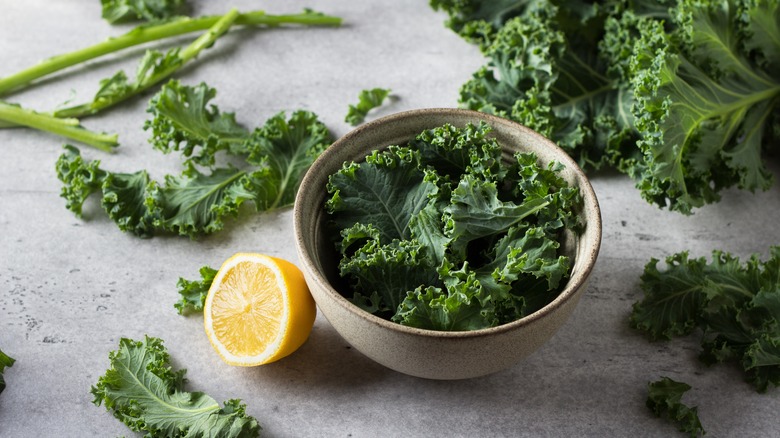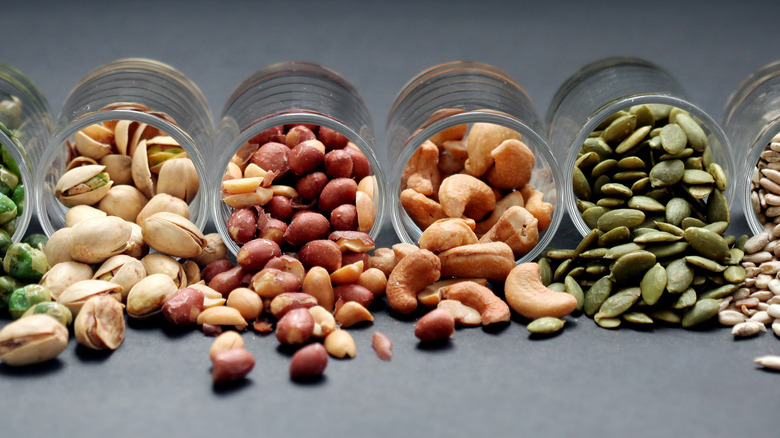7 Foods To Eat And 7 To Avoid For Inflammation
Any immunological response triggers inflammation. If that inflammation is long-lasting, it can lead to the development of a myriad of health conditions, including cancer, depression, and Alzheimer's disease (via Harvard Health Publishing). Luckily, even in people predisposed to inflammation, there are ways to mitigate the damage. By choosing a whole-food-based diet, for example, you can stifle the flames of inflammation.
You'll notice that most of the foods linked to inflammation are also tied to weight gain and an increased risk of obesity. According to a study published in the Archives of Medical Science, fat cells release inflammatory chemicals that increase the risk of dying as a result of heart disease, cause insulin resistance and type 2 diabetes to develop, and can cause stroke and the hardening of coronary arteries.
Popular anti-inflammatory diets, including the Mediterranean Diet, the DASH diet, and the MIND diet, are all based on whole foods with an abundance of fruits, vegetables, whole grains, and healthy fats. These diets can successfully decrease inflammation and the accumulation of dangerous free radicals in the body (via Healthline). Let's consider some of the foods that are typically a part of these eating plans, plus some foods you should avoid.
Avoid: Red and processed meat
No one is saying that you shouldn't eat steak or salami ever again, but if it's a daily staple for you, you should consider cutting back. Both red meat and processed meats are rich sources of saturated fat, which is known to cause inflammation (via Cleveland Clinic). Red meat isn't just beef — pork, venison, goat, and lamb are also red meat. Processed meat is smoked or cured, such as bacon, hot dogs, meat jerky, or sausage.
Inflammation can lead to several serious health problems, including cancer, heart disease, and stroke. According to Everyday Health, some people with rheumatoid arthritis report symptom relief when they abstain from eating red meats. Several studies, including a review published in the American Journal of Clinical Nutrition, have determined that replacing red meat with an alternative source of protein such as poultry, fish, legumes, or nuts significantly decrease levels of c-reactive protein (CRP), a marker of inflammation in the body.
Eat: Fruit
Believe it or not, cherries could give ibuprofen a run for its money, considering how great they are at decreasing inflammation, according to research published in Nutrients. Additionally, apples are rich sources of fiber that serve as a source of fuel for the healthy bacteria that reside in your gut, thereby strengthening the intestinal lining and reducing the migration of inflammatory compounds from the gut to the blood (via Eating Well). And don't forget the berries!
Although you probably reach for a glass of orange juice when you feel the sniffles coming on, strawberries contain more vitamin C than oranges. Vitamin C quells the inflammation that causes the immune system to become burdened and stops free radicals in their tracks (via Eating Well). On the other hand, research proves that the polyphenols in blueberries ease existing inflammation and cut new inflammation before it starts. This is why blueberries are believed to decrease blood pressure, improve blood flow, and stop inflammation in the brain.
Pineapples are also a great source of vitamin C. More importantly, these sweet tropical fruits contain an enzyme, bromelain, which appears to reduce inflammation, reduce the stickiness of blood to decrease the risk of clotting, and potentially imbue an anti-carcinogenic effect (via Eating Well).
Avoid: Sugar
It appears that it doesn't take much sugar at all to cause an inflammatory cascade in the body. According to a study published in the American Journal of Nutrition, one can of soda might be enough to adversely affect lipid levels, insulin sensitivity, and inflammation in the body. This inflammation is partly a result of increased production of advanced glycation end products (AGEs), harmful substances created when protein or fat merge with sugar in the blood (via Healthline). AGEs cause oxidative stress and increase inflammation. Sugar also weakens the strength of the intestinal walls, allowing toxins and undigested food particles to leak into the bloodstream, which can also breed inflammation.
Moreover, sugar raises low-density lipoprotein (LDL) cholesterol. Elevated LDL levels and inflammatory markers in the blood are associated with a higher risk of heart disease. Some research seems to bear a potential relationship between a high-sugar diet and cancer risk, but this is controversial, and not all studies show a correlation. Additionally, obesity itself is considered to be a low-grade inflammatory disease. Inflammation messes with the balance of bacteria living in the gut, raising the risk for obesity while, at the same time, obesity itself increases inflammation (via Healthline). It's a very complicated relationship that researchers continue to try to unravel.
Drink: Tea
Polyphenols, powerful antioxidants found in tea, contain anti-inflammatory properties. In one study published in Atherosclerosis, men who consumed black tea for six weeks had lower levels of C-reactive protein (CRP). In another small study published in Nutrition Research, green tea extract also significantly lowered levels of CRP in participants with obesity and hypertension.
If you would like a break from green or black tea, you can spice things up, literally, with a cup of ginger tea. Chinese research published in Foods in 2019 shows that ginger is chock-full of phenols, including gingerols and shogaols, which might protect against inflammatory gastrointestinal conditions, such as colitis, and even reduce muscle inflammation after a tough workout.
If you're in pain and having trouble sleeping, you might want to try chamomile tea, which is a caffeine-free herbal tea that reduces inflammation and is said to help people relax (via Medical News Today).
Avoid: Fried foods
These unhealthiest of all fats are found in margarine, snack foods, and fried foods. The trans-fats created in laboratories to extend the shelf-life of foods are especially harmful and are strong instigators of inflammation in the body. In one study published in the Journal of Nutrition, levels of a blood marker for inflammation (c-reactive protein) was 73% higher among women who consumed the most trans fat.
According to the Arthritis Foundation, trans fats both increase LDL ("bad") cholesterol while decreasing HDL ("good") cholesterol. This combination is what makes them such strong culprits in the development of heart disease. In fact, the risk for heart disease rises by nearly a quarter for every 2% of calories from trans fat eaten each day (via Harvard Health Publishing).
When the government banned trans fats in the United States, health-conscious people and their health providers rejoiced. But it isn't time to start tossing the confetti around quite yet. As the CDC discovered, many food products labeled as "trans-fat free" still contain the dangerous ingredient. For example, 50% of products in the seasoned potato category and 35% of cookies still contain trans-fat. How do they get away with it? There is a federal rule that if any food contains less than half a gram of trans fat in a serving, they can say that it contains none. However, there is no safe level of consumption.
Eat: Turmeric
If your joints have been achy, you might want to have Thai tonight. Turmeric, a spice heavily used in Thai and Indonesian cuisines, is a rich source of curcumin, a polyphenol traditionally used to reduce the inflammation associated with a wide range of conditions, from arthritis to anxiety, as a study published in Foods revealed. Some people even use it to improve their recovery after tough workouts.
Unfortunately, curcumin alone is not easily absorbed. As such, it is often combined with other substances, such as black pepper. The research published in Foods found that the piperine in black pepper increases the bioavailability of curcumin by a whopping 2,000%.
When looking at curcumin supplements, you should select one labeled as being manufactured using "phytosome technology." According to the Cleveland Clinic, this type of curcumin is absorbed 29 times better than other forms. To improve absorption even more, take it with some heart-healthy fats, such as a few slices of avocado or almond butter on whole-grain bread. You should also choose a supplement that is marked as USP verified. The Cleveland Clinic asserts that most people should take 500 milligrams twice daily with food but advises everyone to speak to their doctor before beginning supplementation. There is some concern that these supplements could interact with blood thinners, and individuals with gallbladder disease shouldn't take them at all.
Avoid: Salty processed foods
Lalita Kaul, a nutrition professor at Howard University Medical School in Washington D.C., told the Arthritis Foundation, "The retention of water increases pressure on blood vessels and raises blood pressure." This is important to bear in mind since hypertension is a top risk factor for stroke, kidney disease, and heart attack.
In one study, published in Nature Immunology, people with multiple sclerosis who ate a high-salt diet were found to have higher-than-expected levels of pro-inflammatory cytokines, as well as lower-than-expected levels of anti-inflammatory cytokines, in their immune cells. The researchers concluded that people at increased risk of developing the disease should be especially conscious of their salt intake.
Although you may already know that salt increases blood pressure, you might still be shocked to learn that high salt intake is linked to inflammation and organ damage in hypertensive patients, independent of blood pressure, according to research printed in the European Journal of Clinical Nutrition.
Eat: Olive oil
The antioxidants in extra-virgin olive oil curtail inflammation. In fact, according to a study appearing in Current Pharmaceutical Design, olive oil may be as effective as top-selling anti-inflammatory medications currently sold at your local drugstore. Don't start chugging oil yet, though — you would have to consume nearly a quarter-cup to get the pain relief that you'd enjoy from just 10% of the adult dose of ibuprofen (via Healthline). The GI Society adds a bit more context: Although oleocanthal and ibuprofen don't resemble each other molecularly, they both appear to inhibit the same enzymes that cause inflammation and pain.
Does this mean you should only use olive oil? You may have heard that consuming plant-based oils rich in omega-6 oils, such as soybean, canola, corn, and sunflower oils, will increase inflammation in the body. However, an analysis of 15 clinical trials found no link between the omega-6 fatty acid, linoleic acid, and inflammation and concluded that we should all continue to consume 2 to 4 tablespoons of vegetable oil each day, as recommended by the Institute of Medicine and the American Heart Association (via Medical News Today).
Avoid: White flour
Although most of us can agree that there's nothing like a steaming bowl of spaghetti on a chilly night, you might want to at least pick up a box of whole-wheat noodles. Refined carbohydrates are generally found in foods that are ultra-processed to the extent that many of the nutrients have been removed. For example, white-flour pasta is made from wheat that has been stripped of fiber, vitamins, and minerals.
According to research published in the Journal of the American College of Cardiology, eating large amounts of foods like white bread, pasta, or pastries will cause your blood sugar and insulin levels to swing from high to low rapidly. These swings occur because the fiber and protein, which slow digestion, have been removed from these foods. High blood glucose, which occurs shortly after eating a high-starch meal, causes the blood vessels to constrict and creates free radicals that promote plaque formation in the arteries.
Eat: Fatty fish
You might want to switch out your steak for a tuna steak. The omega-3 fatty acids in certain fish, including salmon and tuna, reduce inflammation. The Arthritis Foundation suggests adding fatty fish to your menu because they interrupt certain types of immune cells that trigger inflammation throughout the body. Research proves that individuals who eat more fish have a lower risk for rheumatoid arthritis, in addition to the lower chance of heart disease that you're probably already familiar with.
However, many people are surprised and disappointed to learn that fish oil supplements don't reduce the risk of inflammation-related diseases such as heart disease or cancer. You may still be prescribed fish oil if your triglycerides are exceedingly high. Otherwise, you'll most likely be advised to eat a generally healthy diet, including fish two times a week, and to add plenty of physical activity into your daily life (via Harvard Health Publishing).
Avoid Alcohol
The Mayo Clinic emphasizes that alcoholic hepatitis is inflammation of the liver brought on by drinking excessive alcohol, usually for a long time, although it can also occur in "moderate" drinkers. The symptoms of alcoholic hepatitis include loss of appetite, nausea and vomiting, abdominal pain, a low-grade fever, and a general sense of malaise. Although alcohol hepatitis most often occurs in people with a history of drinking more than 3.5 ounces of alcohol daily for at least two decades, you might be wondering if your nightly cocktail could still be problematic.
This is where things get complicated. The Arthritis Foundation notes that although drinking copious amounts of alcohol leads to inflammation, moderate drinking may actually reduce it. Although a 2010 study published in Rheumatology determined that drinking alcohol reduced inflammation and the severity of symptoms associated with rheumatoid arthritis, a 2018 study found no difference in the level of joint inflammation observed via visualization of the joints — leading researchers to believe that the "anti-inflammatory effects of alcohol could be systemic and not involve the joints specifically" (via Medical News Today).
Eat: Green leafy vegetables
Research has shown that green leafy vegetables measurably decrease blood levels of C-reactive protein (CRP) and reduce the risk of many inflammatory diseases, including several eye conditions (via Penn Medicine).
As part of the study, patients were asked to eat a diet rich in dark green leafy vegetables, including spinach, kale, collard greens, Swiss chard, and bok choy. The researchers measured their CRP levels twice over the year-long study period. The researchers discovered that the diet caused a spike in beta-carotene levels in the blood, which was expected. However, their CRP levels decreased from an average of 7 to an astounding 1.75 over six months. The researchers hypothesize that this level of improvement would "lower their risk for complications of eye diseases that involve inflammation, including dry eye, glaucoma, age-related macular degeneration, diabetic retinopathy, and uveitis" (via Penn Medicine).
The Oldways Nutrition Exchange recommends choosing the darkest greens that you can find for optimum nutrient content. Adding a little olive oil to your greens can enhance absorption of the fat-soluble vitamins, and eating both raw and cooked greens will ensure the absorption of a variety of anti-inflammatory nutrients.
Avoid: Too much coffee
How could it be that your morning brew both increases and decreases inflammation? The truth is that researchers are still trying to figure this out. It is known that drinking coffee reduces health conditions caused by low-grade inflammation. In an analysis of 15 studies on coffee and caffeine published in Critical Reviews in Food Science and Nutrition, researchers determined that coffee is anti-inflammatory, but not because of the caffeine that it contains. Rather, it is likely the antioxidants in the coffee that protect against painful inflammation.
On the other hand, caffeine itself might counteract the anti-inflammatory benefits from coffee consumption. Other research has found that high coffee consumption actually increases inflammation. For example, in one study, men and women who drank more than 200 milliliters of coffee per day had higher blood levels of several proteins used to measure inflammation.
The Arthritis Foundation points out that although the polyphenols in coffee protect against cellular damage and the beverage might help protect against gout, there is also some evidence that it increases the risk of rheumatoid arthritis and osteoporosis. In the end, it's best to stick to one or two cups of coffee a day and avoid sugar-laden specialty drinks.
Eat: Nuts and seeds
Nuts and seeds contain anti-inflammatory alpha-linoleic acid (ALA), a type of omega-3 fatty acid, magnesium, l-arginine, and vitamin E. The combination of these oils and antioxidants means that these foods pack a powerful punch for sufferers of inflammatory conditions, such as arthritis (via Arthritis Foundation).
If you're nuts about nuts, you should know that some varieties are better than others for reducing inflammation. For example, walnuts have the highest omega-3 content of all the nuts and appear to have a significant CRP-lowering effect. Almonds are fibrous and rich in vitamin E and healthy fats, which lower markers of inflammation, including CRP. And don't forget flaxseed and chia seed, which can both be blended into your morning smoothie or used to add crunch to your yogurt parfait. These seeds are rich sources of anti-inflammatory fatty acids, add fiber to your meal, and contain heart-healthy minerals. Peanuts and hazelnuts are also abundant in l-arginine, an amino acid that is a precursor for nitric oxide production. Nitric oxide is a vasodilator, meaning that it relaxes blood vessels, allowing more blood to flow through them and reducing blood pressure.
Research published in the American Journal of Clinical Nutrition showed that replacing three servings of red meat, processed meat, eggs, or refined grains with nuts significantly lowers CRP levels. The scientists hypothesized that the fatty acids, fiber, vitamin E, l-arginine, and phenolic compounds in walnuts make them especially anti-inflammatory.


